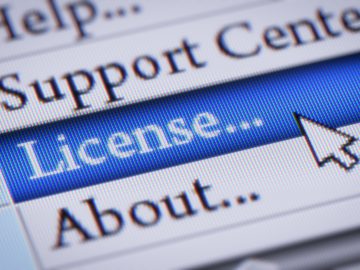It’s hard to think of anything more important than one’s data. It is our private information, our thoughts and feelings, which can often be deeply personal. The thing that makes it invaluable is the fact that it belongs to you; no one else can access it without your permission. But if you are using unlicensed software, you may be putting this valuable information at risk due to what is known as software piracy or copyright infringement. So how can unlicensed software compromise your data?
Software theft affects everyone; both companies and consumers alike suffer the consequences. Because of this serious crime, corporations typically spend billions of dollars annually for cybersecurity measures just to protect their intellectual property (IP) from being stolen, whether they’re large corporations small businesses just getting started.
A breach to any corporate database can result in serious damage to business operations, including financial harm. Combine that with the potential for data theft and you have a recipe for disaster.
Just imagine if your sensitive information ended up in the wrong hands, like it did in one case where hackers got access to train tickets issued by the Massachusetts Bay Transportation Authority (MBTA). They used that data to resell their stolen product on Craigslist. The hacker group at least had the decency not to use credit card info because they didn’t want money; instead, they just wanted free rides!
As consumers using unlicensed software, we’re playing with fire when it comes to our own personal data. And if you think about it, home and business software products and services are more than just another purchase. It’s a mission critical purchase that we trust will help us run our lives without any issue or concern.
At first glance, unlicensed software may seem like an easy way to save some cash, but the truth is it can cost you your privacy as well as jeopardize your data security – and life as you know it! It’s definitely important to know how unlicensed software can compromise your data.
It starts with small things that most would not give a second thought about, such as downloading music or video files illegally through peer-to-peer file sharing sites. But once consumers start using pirated software for their day-to-day tasks, these can open up their systems to exploit which becomes much easier for cybercriminals to steal information from their computers.
In fact, a 2012 study from the Business Software Alliance (BSA) found that 97 percent of all material produced in a business setting is now stored digitally. That data amounts to an estimated $1.7 trillion annually and could come at a very high price if it falls into the wrong hands.
Because unlicensed software contains cyber-threats, there needs to be safeguards put in place to help protect consumers’ information. For example, Microsoft has released more than 50 security bulletins related to Windows since 2003; these are serious situations where hackers can gain access to your computer by exploiting weaknesses in the operating system (OS). This kind of loophole is due to certain parts of code not being licensed properly or having malicious software imbedded inside the OS. These are just two of many vulnerabilities that can compromise your data security, prevent you from accessing your own files and/or cause serious damage to your computer hardware.
Think about it – wouldn’t you be more comfortable knowing you have the latest version of Microsoft Windows completely licensed, with no possible way for any outside party or third-party effort to tamper with it? Then how could any hacker access your system without proper authorization?
If you’re looking for an easy way to avoid these issues altogether, then check out the following tips below on how to safeguard yourself against cybercriminals. One last thing – don’t forget to let everyone else know about this too!
Get into the habit of checking for software licensing compliance at least once a year.
Always make sure to use licensed, legal downloads for any new PC or laptop purchase. If you can’t, see if your employer offers new computers with pre-installed licenses.
Look out for unauthorized copies of your company’s software on employees’ systems including email servers, laptops and even network storage devices which are often overlooked until it’s too late. This way you’ll know that the only person accessing these files is authorized to do so. Don’t forget to check cloud-based services as well!
If you’re running an enterprise business where there are multiple users generating data transactions throughout the day, then regular checks need to be done on their individual machines – this will ensure that all information generated leads back to the correct source.
For home use, you can go one step further by installing anti-virus protection on your other devices such as smartphones which are becoming more popular for storing private data. It’s said that there are at least 500,000 new malware variants released each day, so it’s important to monitor these other devices too.
Thankfully, there are many resources available via BlueChip, while also posting security alerts and educational articles. We can educate ourselves more on how unlicensed software can compromise our data. As a company leader in cyber security product development, BlueChip helps their solution partners prevent attacks through collaboration – this includes sharing of knowledge online along with tips on how to properly use licensed software.
By following these tips above, licensed software, you can prevent cybercriminals from taking advantage of any loopholes. So what are you waiting for? Take the time now to safeguarded your business or home computer today!
